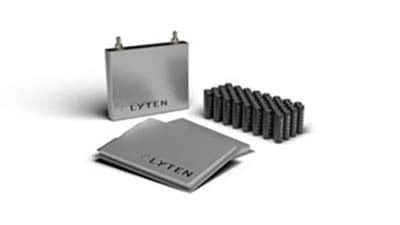
San Jose, California – Lyten, an advanced materials company, is disrupting the electric vehicle battery industry with the introduction of its LytCell EV™ lithium-sulfur (Li-S) battery platform. This latest Silicon Valley battery innovation is optimized specifically for the electric vehicle (EV) market and is designed to deliver 3x the gravimetric energy density of conventional lithium-ion (Li-ion) batteries. Lyten has worked closely with the U.S. Government for several years to test and improve LytCell™ capabilities in select defense-related applications and is now ready to introduce its battery technology platform to the electric vehicle market.
The Lyten 3D Graphene®-based Li-S architecture has the potential to reach a gravimetric energy density of 900Wh/kg, which will significantly outperform both conventional lithium-ion and solid-state batteries. Lyten Sulfur Caging™ is the technology used in LytCell batteries to unlock the performance potential of sulfur by arresting the 'poly-sulfide shuttle,' a cycle-life compromising factor that has up to now prevented practical Li-S use in battery electric vehicles. Under Department of Defense (DOD) test protocols, a LytCell prototype design has demonstrated greater than 1,400 cycles.
Lyten's batteries will be safer in vehicles than conventional Li-ion batteries because Li-S does not contain oxygen from metallic oxides, which is what drives thermal runaway events that have plagued many EVs.